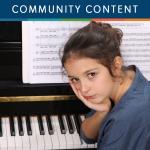Monitor and encourage school attendance: Regular attendance is a critical factor in school success because students are more likely to succeed in academics when they attend school consistently. All students who have reached the age of 6 years or who will have reached the age of 6 years by February 1 until the age of 16 years are required to attend school regularly. Each parent of a child within the compulsory attendance age is responsible for their child’s attendance as required by law.
Know what your child is learning: The Year-at-a-Glance is a document that informs parents and students of the recommended pacing and content standards for selected courses. It includes the topics to be taught each quarter and a list of instructional resources. The Year-at-a-Glance is only a recommended pacing guide; school leaders and teachers make the final decision regarding the pacing of any program of study. The classroom teacher is always the best source of information regarding content and pacing. The Year-at-a-Glance is supplied as a model of one recommended path to the completion of a course.
Know where your child can get help – Use the FloridaStudents.org website:
This site is specially designed for students and parents. It has over 2,000 tutorials, videos, and other resources to support your child’s learning in language arts, math, science and civics. To get help on a specific concept, just click on the subject, the grade level, and the standard you need at https://floridastudents.org/#.
Read to your child: Reading is the heart of education. Read to your child daily from a book that he/she cannot quite yet read on his/her own. For information on what to read to preschool, elementary, middle or high school students, please read The Read-Aloud Handbook by Jim Trelease.
Stay informed: Keep up with changes and what your children should be doing at the “Just for Parents” FLDOE website: http://www.FLdoe.org/family/.
Take your child to the library: There are libraries located throughout every county.
Encourage writing: Writing makes thinking easy to see. Write with your child and let him/her see you writing – shopping lists, thank you notes, to-do lists. Work with your child on his/her written assignments to add detail and to express ideas in order.

Make math part of your language: Your home is a great place to begin to explore and “talk” mathematics with your child. Incorporating math activities and language into familiar daily routines will show your child how math works in everyday life. Play board games, solve puzzles and ponder brain teasers with your child. Your child will enjoy these kinds of activities while enhancing his or her mathematical thinking. Point out the mathematics involved, and have your child discuss the strategies he or she used. For more tips on helping your child succeed in mathematics, visit the National Council of Teachers of Mathematics https://www.nctm.org/.
Make science real: Science is all around us. Involve your child in gardening, caring for family pets, trips to the beach, looking at the stars in the night sky, conducting experiments and other activities that can contribute to a love of science.
Take your child on a “field study”: There are 24 miles of beaches and lots of history in our city. Take your child to downtown St. Augustine and surrounding historical sites to help them imagine life long ago. Social studies opportunities surround us in St. Johns County. Our community is also full of artists – painters, sculptors, glass blowers, potters and musicians. Local schools offer excellent fine arts programs, exhibits and performances for families to explore the arts together.
Get moving: Physical activity is important for good health. Walk, bike ride, surf or play ball with your child. Make it a point to do something active with him/her daily.
Request a mentor: Mentoring is a one-to-one relationship between a caring adult and a student who could benefit from extra help and support. Mentoring has a proven record as a powerful factor in helping students improve their grades and self-esteem and in raising goals and expectations. Mentors serve as coaches, supporters, role models and advocates and work closely with teachers and school staff. Parents interested in the possibility of having a mentor for their child should contact the school’s guidance counselor for more information.
Communication
Reading and writing: Talk to your child as often as possible. Talk about his/her day, hopes, goals, and interests. Use interesting words as you talk. Play word games with your child.
Parent-Teacher Conferences: One of the best ways to find out how your child is doing in school is through parent-teacher conferences. Your child’s teacher may request to schedule a conference; however, if you would like to speak to your child’s teacher, you may call, write or e-mail the teacher to set one up. Please be flexible when scheduling a time. Remember, this is the opportunity for you to work with the teacher as a team. After the conference, follow up. Keep in touch. Talk to your child about the conference. Stress the positive things the teacher discussed and talk about suggestions for improvement.
Websites: There is a wealth of information on each school’s website. Get in the habit of checking it regularly for school and district updates.
Check Home Access Center: Access at https://homeaccess.stjohns.k12.fl.us to check grades, FAST scores, assignments and attendance. See Home Access Center for more information.
Pay attention to what comes home in your child’s backpack.

Home Access Center
https://homeaccess.stjohns.k12.fl.us
St. Johns County School District has a web-based service called Home Access Center (HAC) to allow both students and parents to view student educational information.
When using HAC, you will be able to see:
A calendar of significant events (assignments due, field trips, absences,)
Student’s schedule of classes (not available during summer months)
Detailed attendance and discipline information
Homework assignments, tests and grades
Current progress in each class (not available during summer months or for dual enrollment courses)
Credits earned toward graduation
Standardized Test Scores
Emergency contact information
Parents and guardians will be required to show a photo ID at the child’s school to be granted a username and password to HAC. Once granted a HAC account, you may use the same account to view all your children’s information.
Students will be assigned their own HAC accounts. Account information will be distributed to students at the school’s discretion.









